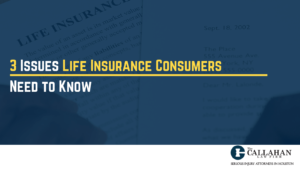3 Issues Life Insurance Consumers Need to Know

Life insurance companies are making it awfully easy to obtain a policy. Though most of these companies sincerely desire to help the family members of those who pass away, some are willing to extend a policy to simply make a profit. If you are interested in purchasing life insurance, you should be aware of the many nuances of this form of insurance. Here’s a quick look at what you should focus on when researching life insurance policies.
Low Premiums
In general, the lower your life insurance premium, the less benefits will be paid out to your beneficiaries. Low premiums are tempting yet they might not provide loved ones with enough money to maintain the quality of life enjoyed while the policyholder was alive. Perform a thorough review of your finances prior to obtaining a life insurance policy to determine if you can make the monthly premium payments. If you cannot cover the cost of the initial premium, do not take out the policy.
Furthermore, low premiums might eventually spike to a higher rate later in the life of the policy. Make sure you completely understand the life insurance policy’s rates before making a commitment. Though you might be able to afford the low premiums today, do not assume your salary will gradually increase to the point that covering ensuing higher premiums is manageable.
Living Benefits
Some life insurance policies provide living benefits. Living benefits are typically tied to cash value term life insurance policies. Term life insurance policies can be acquired with one or several riders that pay cash while the policyholder is still living. However, certain circumstances have to be met in order for living benefits to kick in. As an example, policyholders who are terminally ill might be able to receive some of their death benefit ahead of time. In such cases, a portion of the death benefit can be provided ahead of time for assistance with paying medical expenses and living expenses.
Living benefits are also available for the chronically ill who cannot perform the daily activities ranging from getting out of bed to bathing and so on. Furthermore, if you are critically ill with cancer or ill following a stroke, heart attack, renal failure, etc., living benefits may be available if your policy allows for them. However, living benefits only pay so much. As an example, consider an individual with a $200,000 death benefit. He or she is provided with $150,000 in living benefits after qualifying under one of the riders. In such a scenario, the insurance provider will only pay the remaining $50,000 in death benefits after the insured passes away.
The Issue of the Medical Exam
In general, life insurance providers may require applicants to undergo a medical exam. In most cases, this exam is conducted prior to the approval of the policy. However, some life insurance companies are willing to extend a policy to those who have not undergone a physical exam.
Though the physical exam might not be necessary to obtain life insurance, the insurers will still ask the standard health questions on the application. The fact that there is not a medical exam prior to the point in time at which the policy is taken out may result in higher premiums. Regardless of whether you have a physical exam prior to obtaining your life insurance policy, you should be aware of the fact that life insurance providers are inclined to question all claims if the insured passes away within the first two years of the policy. There is no guaranteed payout for any life insurance claim.
Life Insurance Assistance is a Phone Call Away
The moral of this story is those interested in life insurance should do their homework prior to taking out a policy. If you need any sort of assistance disputing your life insurance provider’s denial, do not attempt to play the role of David against Goliath. Reach out to our attorneys for in-depth no cost evaluation of your case.

Michael S Callahan is an attorney and founder of The Callahan Law Firm. He focuses his practice on representing individuals and families in personal injury cases involving motor vehicle and truck accidents, workplace accidents and defective products. With over 25 years of experience, he is dedicated to fighting on behalf of people whose lives have been forever altered by the negligence and carelessness of corporations and individuals. Originally trained as a mechanical engineer, Michael has been practicing law and fighting for justice for those who need it most since 1994. He is board-certified in Personal Injury Trial Law by the Texas Board of Legal Specialization and a member of various esteemed legal associations. Outside of work, Michael enjoys spending quality time with his family, outdoor activities, and continually striving to improve as a trial lawyer and human being.











